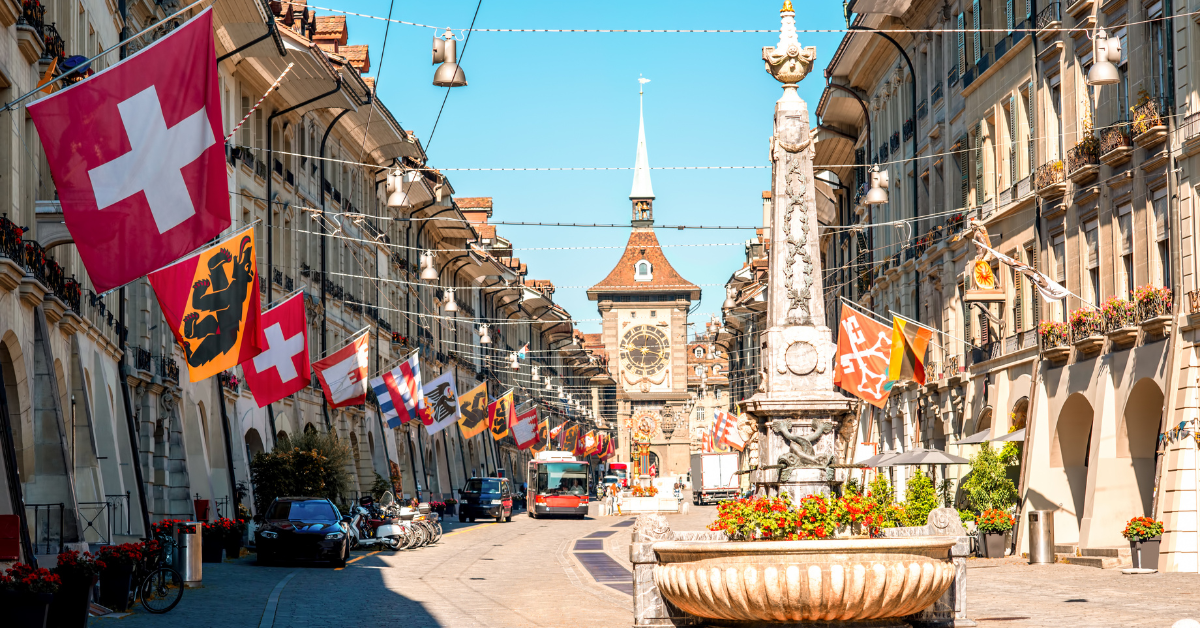Bern, the capital of Switzerland, is a city where medieval history, natural landscapes, and sports culture coexist harmoniously. While in Chinese it is written as “伯恩,” in Japanese it is more commonly recognized as “ベルン.” This article explores not only the linguistic difference but also how Japanese people perceive Bern in terms of culture, politics, and everyday life.
The Kanji Representation “伯恩” of Bern
In Chinese, Bern is written as “伯恩.” This is a phonetic transliteration that reflects pronunciation rather than meaning. Many foreign cities are written in Kanji in Chinese, and Bern is one such example.
In Japanese, however, foreign city names are generally written in katakana, so “ベルン” is the established form. As a result, the Kanji form “伯恩” is unfamiliar to most Japanese people and is usually only encountered in Chinese-language texts or academic materials.
The Image Japanese People Have of Bern
Although Bern is the capital, it differs from large, bustling cities and is instead associated with calmness and tranquility. Japanese impressions of Bern can be summarized as follows:
- Historical Scenery
The UNESCO World Heritage-listed Old Town, with its arcades, fountains, and stone buildings, is symbolic of Bern. It strengthens the image of Bern as an “old European city.” - Harmony with Nature
The Aare River curves around the city, blending beautifully with surrounding hills. For Japanese travelers, the proximity of nature and urban life is a particularly appealing feature. - Political and Cultural Center
Bern houses the Swiss Federal Parliament and frequently hosts international conferences and cultural events, giving it recognition as a hub of politics and culture.
Bern and Its Connection to Sports
Bern is also a city with a deep connection to sports, particularly football.
- The Presence of Young Boys
The local club, BSC Young Boys, enjoys great popularity in Switzerland and often appears in international tournaments. Its home stadium, Stade de Suisse, fills with passionate supporters, creating an atmosphere that strongly impresses visitors. - The Miracle of Bern
During the 1954 FIFA World Cup held in Switzerland, Bern hosted one of the most historic matches. West Germany’s victory over Hungary became known as the “Miracle of Bern,” etching the city’s name into world football history. - A City of Everyday Sports
Beyond professional sports, Bern regularly hosts cycling races and running events. For visitors, this reinforces its image as a city where sports are integrated into daily life.
Representations of Bern
| Representation | Region of Use | Description | Japanese Impressions |
|---|---|---|---|
| ベルン | Japan | Standard katakana representation | Historic capital, city rich in nature |
| 伯恩 | Chinese-speaking regions | Kanji transliteration | Exotic and academic impression |
| Bern | Europe, English-speaking regions | German/English form | International city name, sports stage |
Bern’s Culture and Daily Life
Bern’s appeal extends beyond history and tourism. The richness of everyday life also contributes to its favorable image among Japanese people.
- Public transportation is highly developed, and city planning emphasizes environmental sustainability
- Local markets and cafés serve as everyday spaces for citizens as well as tourists
- Festivals and music events allow for cultural exchange between locals and visitors
Japanese Travelers’ Purposes in Visiting Bern
| Purpose | Reason for Popularity Among Japanese | Related Spots |
|---|---|---|
| Strolling through the city | Experience medieval atmosphere | Old Town, Zytglogge Clock Tower |
| Nature exploration | Close integration of city and nature | Aare riverside paths, Rose Garden |
| Watching sports | See local club matches and international tournaments | Stade de Suisse |
| Political/cultural visits | Symbol of Switzerland’s role as capital | Federal Parliament, museums |
Bern as a Sports City
| Sport | Features | Japanese Impressions |
|---|---|---|
| Football | Home of BSC Young Boys, site of historic World Cup match | Passionate supporters, the Miracle of Bern |
| Cycling | Tour de Suisse stages held in Bern | Healthy and nature-friendly sports city |
| Running | Numerous citywide events | Sports seamlessly integrated into daily life |
Conclusion
In Japanese, Bern is written as “ベルン,” while in Chinese it appears as “伯恩.” The katakana form is the one familiar to Japanese people, while the Kanji form is a transliteration specific to Chinese.
For Japanese people, Bern is associated with a historic old town, harmony with nature, its role as a political and cultural hub, and its identity as a sports city. Football, in particular, enhances its global recognition, but cycling and running also highlight the active lifestyle of its citizens.
Thus, Bern is more than just a capital—it is a multifaceted city where culture, nature, and sports coexist, leaving a lasting impression on Japanese visitors.






